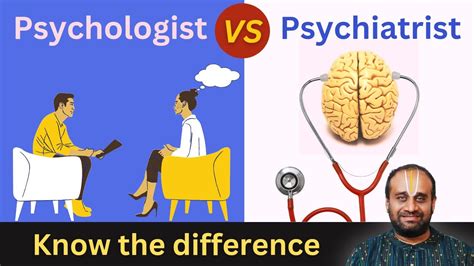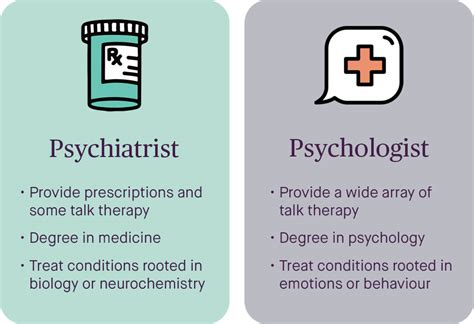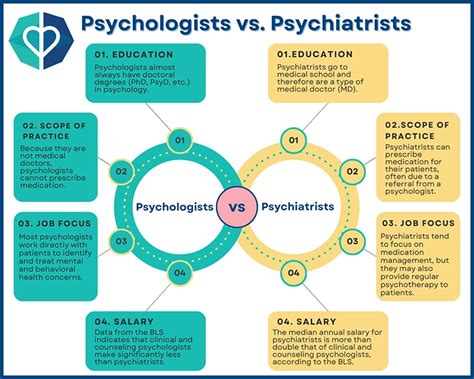The distinction between psychology and psychiatry is a crucial one, as both fields deal with the study and treatment of mental health, but they approach it from different angles. Psychology focuses on the study of human behavior, mental processes, and emotional experiences, with an emphasis on understanding the underlying psychological mechanisms that drive human thought and behavior. Psychiatrists, on the other hand, are medical doctors who specialize in the diagnosis, treatment, and prevention of mental, emotional, and behavioral disorders. This fundamental difference in approach and training has significant implications for the way these professionals interact with patients and address mental health issues.
Key Points
- Psychology focuses on the study of human behavior, mental processes, and emotional experiences.
- Psychiatry is a medical specialty that deals with the diagnosis, treatment, and prevention of mental, emotional, and behavioral disorders.
- Psychologists typically hold a doctoral degree in psychology (Ph.D. or Psy.D.), while psychiatrists hold a medical degree (M.D. or D.O.).
- Psychologists are trained to provide talk therapy, behavioral interventions, and psychological assessments, while psychiatrists are trained to prescribe and manage medications.
- Both psychologists and psychiatrists play critical roles in the mental health system, and often work together to provide comprehensive care.
Differences in Training and Scope of Practice

One of the primary differences between psychology and psychiatry lies in the training and education that professionals in these fields receive. Psychologists typically hold a doctoral degree in psychology (Ph.D. or Psy.D.), which involves 4-6 years of graduate-level education and training in research, theory, and practice. In contrast, psychiatrists hold a medical degree (M.D. or D.O.), which requires 4 years of medical school and 4 years of residency training in psychiatry. This difference in training has significant implications for the scope of practice, as psychologists are trained to provide talk therapy, behavioral interventions, and psychological assessments, while psychiatrists are trained to prescribe and manage medications.
Psychological Assessment and Intervention
Psychologists are trained to conduct comprehensive psychological assessments, which involve the use of standardized tests, interviews, and observational methods to understand an individual’s cognitive, emotional, and behavioral functioning. Based on the results of these assessments, psychologists develop and implement evidence-based interventions, such as cognitive-behavioral therapy, psychodynamic therapy, or behavioral modification, to help individuals manage symptoms, improve coping skills, and enhance overall well-being. In contrast, psychiatrists tend to focus more on the medical aspects of mental health, including the diagnosis and treatment of psychiatric disorders, such as depression, anxiety, or psychosis, using pharmacological interventions.
| Profession | Scope of Practice | Training |
|---|---|---|
| Psychologist | Talk therapy, behavioral interventions, psychological assessments | Ph.D. or Psy.D. in psychology |
| Psychiatrist | Diagnosis, treatment, and prevention of mental, emotional, and behavioral disorders, medication management | M.D. or D.O. with residency training in psychiatry |

Implications for Mental Health Care

The distinction between psychology and psychiatry has significant implications for the delivery of mental health care. In recent years, there has been a growing recognition of the importance of integrated care, which involves the collaboration of mental health professionals from different disciplines to provide comprehensive and coordinated care. By working together, psychologists and psychiatrists can develop and implement treatment plans that address the complex interplay between psychological, social, and biological factors that contribute to mental health. This integrated approach can lead to better outcomes, improved patient satisfaction, and more efficient use of resources.
Evidence-Based Practice
Both psychologists and psychiatrists are committed to evidence-based practice, which involves the use of scientifically supported interventions and treatments to address mental health issues. However, the nature of the evidence and the types of interventions used can differ significantly between the two fields. Psychologists tend to rely on psychological theories and research to inform their practice, while psychiatrists rely on medical research and clinical trials to guide their treatment decisions. By combining these perspectives, mental health professionals can develop and implement comprehensive treatment plans that address the complex needs of individuals with mental health issues.
What is the primary difference between psychology and psychiatry?
+The primary difference between psychology and psychiatry lies in their approach and training. Psychology focuses on the study of human behavior, mental processes, and emotional experiences, while psychiatry is a medical specialty that deals with the diagnosis, treatment, and prevention of mental, emotional, and behavioral disorders.
Can psychologists prescribe medication?
+In most states, psychologists are not licensed to prescribe medication. However, some states have laws that allow psychologists to prescribe certain medications under specific circumstances. In general, psychiatrists are the primary mental health professionals who prescribe and manage medications.
How do psychologists and psychiatrists work together?
+Psychologists and psychiatrists often work together to provide comprehensive care to individuals with mental health issues. They may collaborate on treatment plans, share information, and provide mutual support to ensure that patients receive the best possible care. This collaboration can involve regular meetings, joint treatment sessions, and ongoing communication to ensure that patients receive coordinated and effective care.
In conclusion, the distinction between psychology and psychiatry is a critical one, reflecting different approaches, training, and scopes of practice. By understanding these differences and working together, mental health professionals can provide comprehensive and effective care to individuals with mental health issues. The collaboration between psychologists and psychiatrists is essential for addressing the complex interplay between psychological, social, and biological factors that contribute to mental health, and for developing and implementing treatment plans that lead to better outcomes and improved patient satisfaction.



